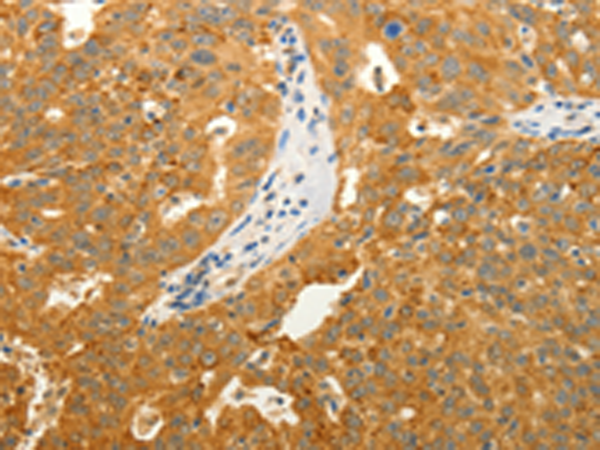

| WB | 咨询技术 | Human,Mouse,Rat |
| IF | 咨询技术 | Human,Mouse,Rat |
| IHC | 1/10-1/50 | Human,Mouse,Rat |
| ICC | 技术咨询 | Human,Mouse,Rat |
| FCM | 咨询技术 | Human,Mouse,Rat |
| Elisa | 1/1000-1/10000 | Human,Mouse,Rat |
| Aliases | VRP, Flt4-L |
| WB Predicted band size | 46 kDa |
| Host/Isotype | Rabbit IgG |
| Antibody Type | Primary antibody |
| Storage | Store at 4°C short term. Aliquot and store at -20°C long term. Avoid freeze/thaw cycles. |
| Species Reactivity | Human |
| Immunogen | Synthetic peptide of human VEGFC |
| Formulation | Purified antibody in PBS with 0.05% sodium azide and 50% glycerol. |
+ +
以下是3篇关于VEGFC抗体的代表性文献,供参考:
---
1. **文献名称**:*Vascular endothelial growth factor C (VEGF-C) promotes tumor lymphangiogenesis and lymphatic metastasis*
**作者**:Stacker SA, et al.
**摘要**:该研究利用抗VEGFC抗体阻断小鼠模型中肿瘤相关淋巴管生成,证明VEGFC通过激活VEGFR-3信号通路促进肿瘤细胞经淋巴系统转移,为抗VEGFC抗体在抑制肿瘤转移中的应用提供了实验依据。
---
2. **文献名称**:*VEGF-C is a ligand for VEGFR-3 (Flt-4) in human endothelial cells and induces lymphangiogenesis in vivo*
**作者**:Joukov V, et al.
**摘要**:首次报道了VEGFC的克隆及其通过结合VEGFR-3受体促进淋巴管内皮细胞增殖的机制,研究中通过特异性抗体验证了VEGFC与受体的相互作用,奠定了VEGFC在淋巴管发育中的关键作用。
---
3. **文献名称**:*Therapeutic targeting of VEGF-C in metastatic cancer: Current status and future perspectives*
**作者**:Alitalo K, et al.
**摘要**:综述了VEGFC在肿瘤微环境中的功能及靶向治疗策略,总结了多种抗VEGFC抗体的临床前研究进展,包括抗体介导的信号阻断和联合免疫治疗的潜力。
---
如需更具体的研究方向(如抗体开发技术或临床实验),可进一步补充说明。
Vascular endothelial growth factor C (VEGFC) is a key signaling protein involved in lymphangiogenesis (formation of lymphatic vessels) and angiogenesis (formation of blood vessels). It primarily binds to tyrosine kinase receptors VEGFR-3 (FLT4) and VEGFR-2 (KDR), activating downstream pathways that regulate endothelial cell proliferation, migration, and survival. VEGFC plays critical roles in embryonic development, tissue repair, and pathological conditions such as cancer metastasis and lymphedema. Dysregulation of VEGFC is linked to tumor-associated lymphatic spread and inflammatory diseases.
VEGFC antibodies are immunodetection tools or therapeutic agents designed to specifically target VEGFC or its receptors. In research, they are widely used to inhibit VEGFC activity in vitro and in vivo, helping to elucidate its biological functions and interactions. Common applications include blocking ligand-receptor binding in mechanistic studies, suppressing lymphangiogenesis in disease models, and detecting VEGFC expression via techniques like Western blot, immunohistochemistry (IHC), or ELISA. Therapeutically, anti-VEGFC monoclonal antibodies or receptor inhibitors are under investigation for cancers (to curb metastasis) and lymphatic disorders. Clinical trials explore their potential in combination with anti-VEGFA therapies to overcome resistance in anti-angiogenic treatments. However, challenges remain in optimizing specificity, delivery, and minimizing off-target effects. Recent advancements include humanized antibodies and bispecific designs targeting multiple angiogenic pathways.
×